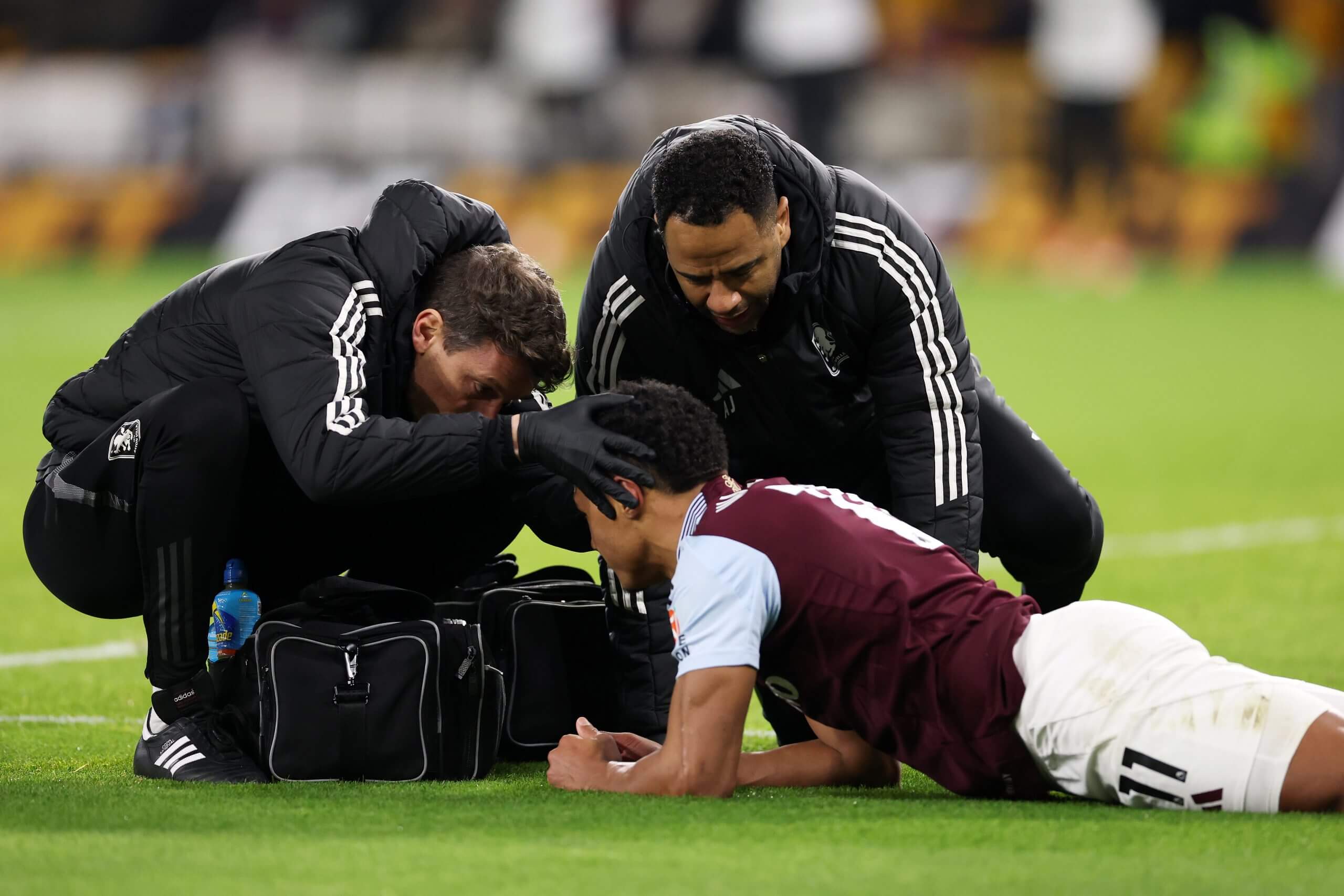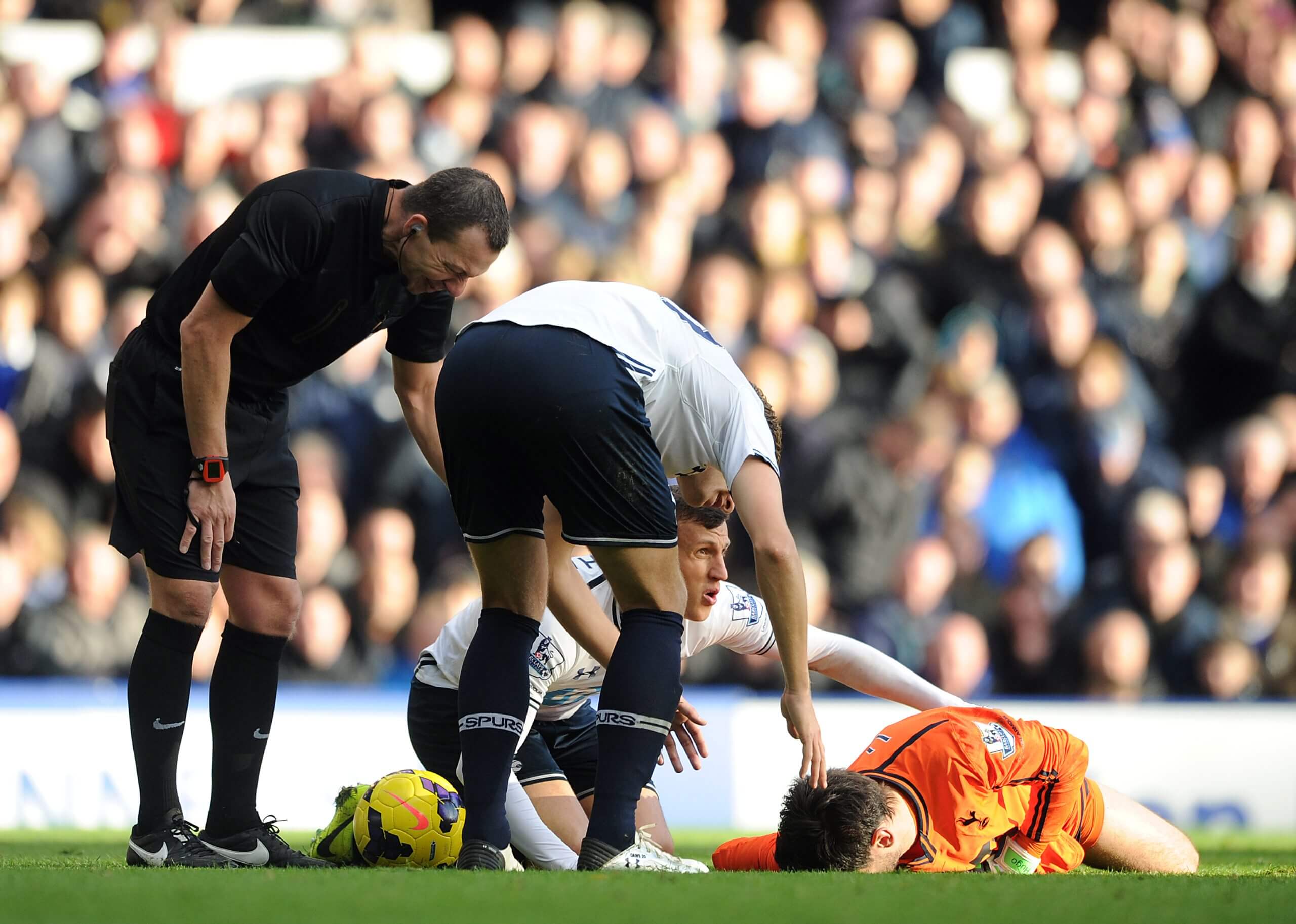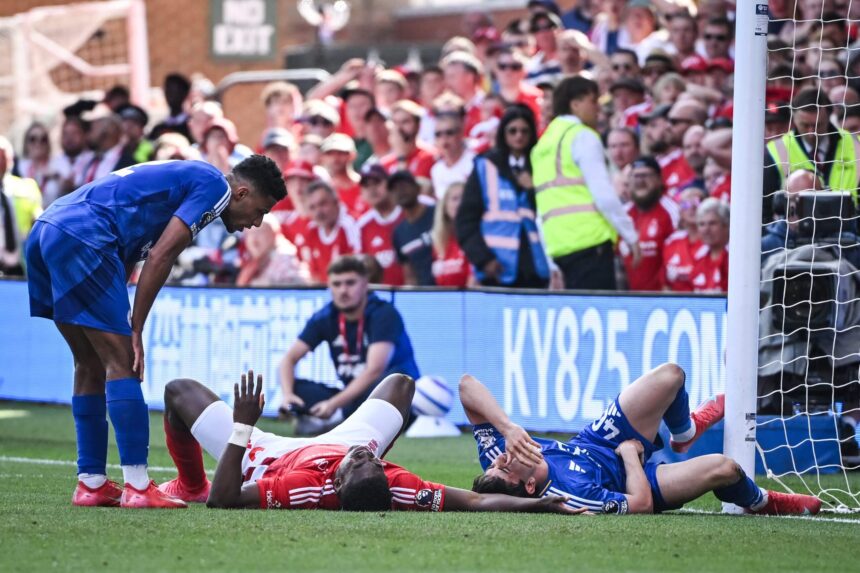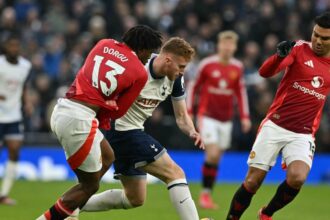As a physio, when you run onto the pitch to treat an injured player, you’ve usually got about 30 seconds to a minute to work out what’s going on.
Sitting pitchside, you’ve seen the incident — a tackle, a collision, a kick — and experience gives you a good idea of what the diagnosis is likely to be but only clinical assessment can tell you the severity and, crucially, whether that player is fit to continue.
Advertisement
It can be a very stressful situation. A crowd of 60,000 people or more may be watching. You might also be live on television around the world. The match has stopped and everyone is waiting. Your earpiece is buzzing with added information from pitchside colleagues and questions from the coaching staff. Any decision you make could change the outcome of the game, so the pressure to get it right is high.
Players are often in shock and pain following an injury. As athletes, they have a strong awareness of their bodies and can sense when something feels wrong. However, they may not fully grasp the severity of their injury or the potential consequences of continuing to play. While self-assessment is a valuable part of the evaluation process, it cannot always be trusted for a complete diagnosis.
Players will often push to stay on the pitch if they believe it is humanly possible. This is where the first-responder physio plays a critical role — staying vigilant, trusting their training and instincts, and having the courage to make the tough decision to remove a player when necessary.
In the case of Taiwo Awoniyi, who collided with the goalpost in Nottingham Forest’s draw with Leicester 10 days ago and who sustained an internal abdominal injury and subsequently underwent emergency surgery, it was clearly a very tricky decision.
The immediate aftermath of Awoniyi’s collision (Justin Tallis/AFP via Getty Images)
I worked in the medical department at Tottenham Hotspur for 20 years, so I worked with Forest head coach Nuno Espirito Santo during his time at Spurs. He is calm and composed, with a strong understanding of the game. Aware that Awoniyi expressed a willingness to continue playing, he recognised that his player was involved in the decision-making process after consulting with the medical team. He had witnessed the incident first-hand and trusted the initial assessment of his medics that it was reasonable for Awoniyi to continue.
Advertisement
Regardless of whether the decision was right or wrong — and of course, we do not know the exact nature of the conversations involved in this specific incident — the medical team initially found no clear reason to remove the player from the pitch following the collision with the post. He passed their initial assessment. Unfortunately, his condition deteriorated later.
In a quieter, more controlled environment, with time for thorough clinical assessment and consultation, they identified an injury that may not have been immediately apparent on the field, which meant he was taken for urgent surgery. It is recognised that some injuries can evolve and worsen over time, which is why medical teams consistently monitor and reassess injured players. After urgent surgery, Awoniyi was placed into an induced coma but is now conscious and, hopefully, on the road to recovery.
Forest put out a statement two days after the game in which they said Marinakis going onto the field of play — when he had an intense conversation with Nuno — was only through “shared frustration between all of us that the medical team should never have allowed the player to continue”. Such a statement is easier with the advantage of hindsight.
Medical teams are integral to a football club, balancing the crucial responsibility of ensuring players perform at their best while protecting them from injury. They serve as advocates for both the players and the club, making critical decisions that can impact the game.
One of their toughest challenges is deciding when to remove a player from the field. If they make this call prematurely, they risk a backlash — returning to the dressing room only to have the player question their choice. “Why did you take me off? I’m fine.”
Such moments can strain relationships with the player and the club, while potentially altering a game’s outcome.
Advertisement
Working with players on a daily basis allows medical teams to develop strong relationships with them, but this can intensify the pressure to make the right decisions.
Players, caught up in the moment, often want to continue playing, but medical staff must prioritise their long-term health, availability, and overall fitness. It can be unwise to let them play on with a minor muscle injury when it’s likely that doing so will make it worse and potentially result in them being unavailable for an extended period.
With a head injury, the Premier League allows three minutes to assess a player. There are clear guidelines around suspected concussion. In such a situation, the player’s input becomes secondary because a concussed person may lack the capacity to accurately assess their condition.

Ollie Watkins is checked by the Aston Villa medical team earlier this season (Naomi Baker/Getty Images)
However, for musculoskeletal or other non-head injuries, such protocols are not available, placing even greater responsibility on medical teams to make informed, often difficult, decisions.
For internal abdominal injuries, the risk of serious harm is significant, requiring a cautious approach that prioritises patient safety, as such injuries can be difficult to detect at the moment of impact.
You have to be very careful not to get influenced by what you think has happened from watching an incident from afar. Some injuries are immediately obvious — you see them and instantly recognise their severity. But in other cases, what appears minor can turn out to be far more serious upon closer examination on the pitch. That’s why it’s essential to approach every situation with an open mind.
In the Premier League, medical staff are supported by Hawk-Eye technology. This system provides one of the medical team members off the pitch with a tablet displaying multiple camera angles of each incident. They can fast-forward, rewind and review the footage at different speeds, allowing for a thorough analysis of the event. The insights gained are then communicated directly to the first responder out on the pitch via an earpiece, ensuring a more informed and accurate on-field assessment.

Medical teams are under time pressure every time they enter the field of play (Shaun Botterill/Getty Images)
For a medical team, continuous reflection is essential to ensuring player safety and improving decision-making. Following every game, our staff at Spurs had two types of debriefs: a ‘hot debrief’ immediately after the match to review our decisions while memories are fresh, and a ‘cold debrief’ later, allowing time for deeper reflection. This process helps us self-audit, regulate our practices and identify areas for improvement.
Advertisement
There are incidents when a player is removed from the field but makes a rapid recovery and is fit to play the next game. In such cases, we must ask ourselves: ‘Did we make the right decision?’. Conversely, there are instances where an injury proves more serious than initially thought, highlighting a missed opportunity to act sooner.
Some managers I’ve worked with were initially resistant when told a player needed to be substituted, unless the injury was unmistakably severe, like a visible fracture or loss of consciousness. In such cases, they could show resentment for several days. However, most managers are respectful — once a decision was made, they trusted the medical team’s judgment.

Hugo Lloris was knocked unconscious against Everton in 2013; the incident led to a rule change (Chris Brunskill/Getty Images)
One notable incident I was involved in led to a transformative change in Premier League regulations.
In 2013, during a match between Tottenham and Everton, our goalkeeper Hugo Lloris was knocked unconscious. Despite the club doctor and I insisting Lloris be substituted for his safety, the manager at the time, Andre Villas-Boas, overruled us. Footage captured an eight-minute exchange, during which we repeatedly argued, “Look, he can’t continue.” But the referee deferred to the manager’s decision, and Lloris was allowed to play on. This incident directly led to a rule change, giving doctors the final authority over player removal, rather than the manager.
It’s important to understand that managers often lack the medical expertise required to fully grasp the basis for clinical decisions. Clear communication is key — explaining the situation in detail helps them understand why a decision was made, which includes acknowledging mistakes and learning from them rather than concealing them.
(Top photos: Justin Tallis/AFP via Getty Images)









